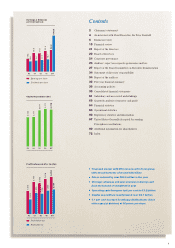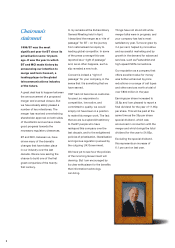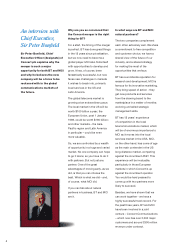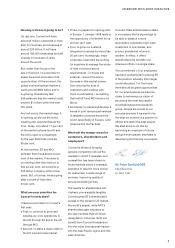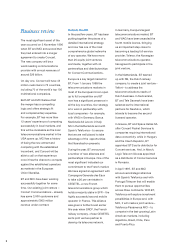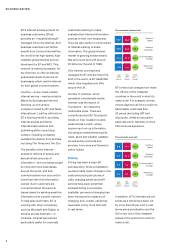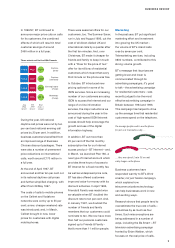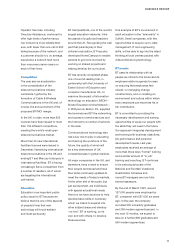BT 1997 Annual Report Download - page 11
Download and view the complete annual report
Please find page 11 of the 1997 BT annual report below. You can navigate through the pages in the report by either clicking on the pages listed below, or by using the keyword search tool below to find specific information within the annual report.BUSINESS REVIEW
11
Operator Services, including
Directory Assistance, continued to
offer high levels of performance.
Our network is more reliable than
ever, with fewer than one call in 200
failing because of the network, and
a customer should not, on average,
experience a network fault more
than once every seven years on
each of their lines.
Competition
The year saw an acceleration
in the consolidation of the
telecommunications industry
worldwide, typified by the
formation of Cable & Wireless
Communications in the UK and, of
course, the announcement of the
proposed BT/MCI merger.
In the UK, to date, more than 200
licences have been issued to more
than 150 different competitors,
creating the world’s most open
telecommunications market.
More than 40 new international
facilities licences were issued in
December, liberalising international
telecommunications in the UK and
ending BT and Mercury’s duopoly in
international facilities. BT is facing
increasingly fierce competition from
a number of resellers, all of whom
are targeting the international
call market.
Education
Education is an important public
policy issue for BT because we
believe that it is one of the aspects
of people’s lives that new
technology will touch earliest
and most profoundly.
BT CampusWorld, one of the world’s
largest education networks, links
thousands of pupils and teachers
around the UK. Recognising the vital
part that parents play in their
children’s education, BT has also
developed HomeCampus to enable
parents to get more involved by
working on shared projects and
helping develop the curriculum.
BT has recently completed phase
one of a world-leading trial, in
partnership with the University of
Exeter School of Education and
computer manufacturer ICL, to
examine the impact of information
technology on education, BEON –
Bristol Education Online Network –
in Withywood, Bristol. ICL supplied
the terminals and BT the networking
and access to remote services and
the Internet to a number of schools
in the area.
Communications technology also
hasakeyroletoplayineducating
and training the workforce of the
future, the quality of which will
be a key determinant of UK
competitiveness in global markets.
All major companies in the UK, and
elsewhere, have a need to ensure
their people are trained and have
their skills continually updated to
meet the needs of today’s markets.
At the other end of the scale, but
just as important, are individuals
with special educational needs.
Here too we have solutions to help
develop basic skills in numeracy
which we intend to expand into
other subject areas and develop
“on-line”. BT is working, on its
own and with others, to develop
these services.
One example of BT’s involvement in
adult education is the “televersity” in
Suffolk. Small companies, with few
opportunities to acquire up-to-date
management, IT and engineering
skills, will be able to tap into the latest
thinking at local centres packed with
videoconferencing technology.
BT people
BT sees its relationship with its
people as critical to the future and its
employee relations agenda focuses
on ensuring that employees feel
valued, on managing change
constructively, and on creating an
environment and culture within which
every employee can maximise his or
her contribution.
BT is committed to providing the
necessary development and training
opportunities to equip our people with
the skills they will need in the future.
Our approach integrates development
and training with business objectives,
job performance and personal
development needs. Last year,
employees received an average of
more than three days “formal” training
and a similar amount of “in job”
training and coaching. BT continues
to be a strong advocate of the
National and Scottish Vocational
Qualification Schemes and
many BT managers are now fully-
trained assessors.
By the end of March 1997, around
127,000 people were employed by
BT, compared with 227,000 six years
ago. In the year, the company
recruited 500 university graduates
and 250 modern apprentices and, in
the next 12 months, we expect to
take on a further 800 graduates and
500 modern apprentices.

